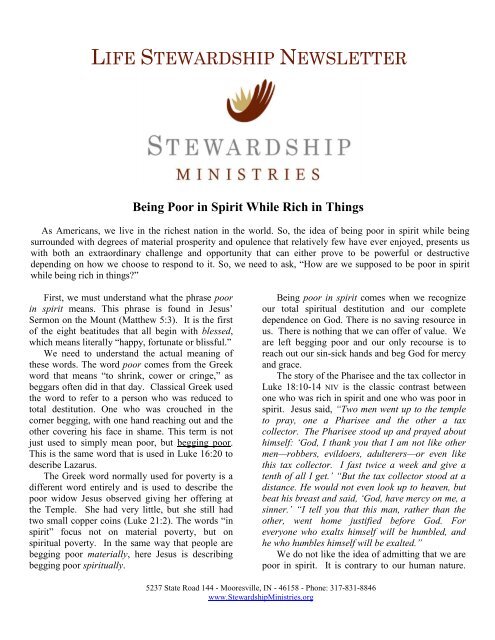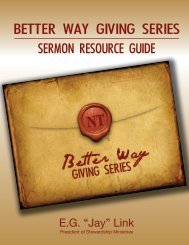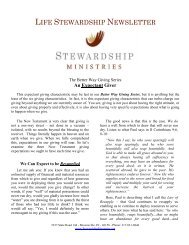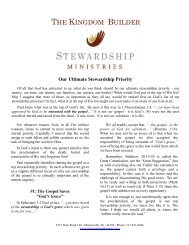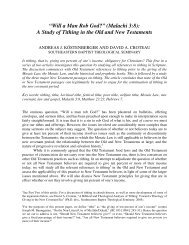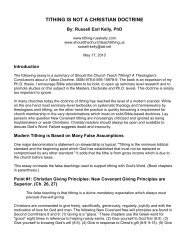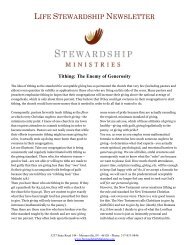Being Poor in Spirit While Rich in Things - Stewardship Ministries
Being Poor in Spirit While Rich in Things - Stewardship Ministries
Being Poor in Spirit While Rich in Things - Stewardship Ministries
Create successful ePaper yourself
Turn your PDF publications into a flip-book with our unique Google optimized e-Paper software.
LIFE STEWARDSHIP NEWSLETTER<br />
<strong>Be<strong>in</strong>g</strong> <strong>Poor</strong> <strong>in</strong> <strong>Spirit</strong> <strong>While</strong> <strong>Rich</strong> <strong>in</strong> Th<strong>in</strong>gs<br />
As Americans, we live <strong>in</strong> the richest nation <strong>in</strong> the world. So, the idea of be<strong>in</strong>g poor <strong>in</strong> spirit while be<strong>in</strong>g<br />
surrounded with degrees of material prosperity and opulence that relatively few have ever enjoyed, presents us<br />
with both an extraord<strong>in</strong>ary challenge and opportunity that can either prove to be powerful or destructive<br />
depend<strong>in</strong>g on how we choose to respond to it. So, we need to ask, “How are we supposed to be poor <strong>in</strong> spirit<br />
while be<strong>in</strong>g rich <strong>in</strong> th<strong>in</strong>gs?”<br />
First, we must understand what the phrase poor<br />
<strong>in</strong> spirit means. This phrase is found <strong>in</strong> Jesus’<br />
Sermon on the Mount (Matthew 5:3). It is the first<br />
of the eight beatitudes that all beg<strong>in</strong> with blessed,<br />
which means literally “happy, fortunate or blissful.”<br />
We need to understand the actual mean<strong>in</strong>g of<br />
these words. The word poor comes from the Greek<br />
word that means “to shr<strong>in</strong>k, cower or cr<strong>in</strong>ge,” as<br />
beggars often did <strong>in</strong> that day. Classical Greek used<br />
the word to refer to a person who was reduced to<br />
total destitution. One who was crouched <strong>in</strong> the<br />
corner begg<strong>in</strong>g, with one hand reach<strong>in</strong>g out and the<br />
other cover<strong>in</strong>g his face <strong>in</strong> shame. This term is not<br />
just used to simply mean poor, but begg<strong>in</strong>g poor.<br />
This is the same word that is used <strong>in</strong> Luke 16:20 to<br />
describe Lazarus.<br />
The Greek word normally used for poverty is a<br />
different word entirely and is used to describe the<br />
poor widow Jesus observed giv<strong>in</strong>g her offer<strong>in</strong>g at<br />
the Temple. She had very little, but she still had<br />
two small copper co<strong>in</strong>s (Luke 21:2). The words “<strong>in</strong><br />
spirit” focus not on material poverty, but on<br />
spiritual poverty. In the same way that people are<br />
begg<strong>in</strong>g poor materially, here Jesus is describ<strong>in</strong>g<br />
begg<strong>in</strong>g poor spiritually.<br />
<strong>Be<strong>in</strong>g</strong> poor <strong>in</strong> spirit comes when we recognize<br />
our total spiritual destitution and our complete<br />
dependence on God. There is no sav<strong>in</strong>g resource <strong>in</strong><br />
us. There is noth<strong>in</strong>g that we can offer of value. We<br />
are left begg<strong>in</strong>g poor and our only recourse is to<br />
reach out our s<strong>in</strong>-sick hands and beg God for mercy<br />
and grace.<br />
The story of the Pharisee and the tax collector <strong>in</strong><br />
Luke 18:10-14 NIV is the classic contrast between<br />
one who was rich <strong>in</strong> spirit and one who was poor <strong>in</strong><br />
spirit. Jesus said, “Two men went up to the temple<br />
to pray, one a Pharisee and the other a tax<br />
collector. The Pharisee stood up and prayed about<br />
himself: ‘God, I thank you that I am not like other<br />
men—robbers, evildoers, adulterers—or even like<br />
this tax collector. I fast twice a week and give a<br />
tenth of all I get.’ “But the tax collector stood at a<br />
distance. He would not even look up to heaven, but<br />
beat his breast and said, ‘God, have mercy on me, a<br />
s<strong>in</strong>ner.’ “I tell you that this man, rather than the<br />
other, went home justified before God. For<br />
everyone who exalts himself will be humbled, and<br />
he who humbles himself will be exalted.”<br />
We do not like the idea of admitt<strong>in</strong>g that we are<br />
poor <strong>in</strong> spirit. It is contrary to our human nature.<br />
5237 State Road 144 - Mooresville, IN - 46158 - Phone: 317-831-8846<br />
www.<strong>Stewardship</strong>M<strong>in</strong>istries.org
We fight aga<strong>in</strong>st acknowledg<strong>in</strong>g it. A good example<br />
of this resistance to admit a poverty of spirit is<br />
found <strong>in</strong> the great hymn “At the Cross.” It has a<br />
l<strong>in</strong>e <strong>in</strong> the first verse that says, “Should He devote<br />
that sacred head for such a worm as I?” David uses<br />
this term “worm” <strong>in</strong> one of his Messianic Psalms<br />
(22:6) NIV “But I am a worm and not a man,<br />
scorned by men and despised by the people.” So,<br />
this term is a biblically <strong>in</strong>spired word describ<strong>in</strong>g<br />
Jesus on the cross.<br />
However, the thought of be<strong>in</strong>g a worm is so<br />
repulsive <strong>in</strong> our modern culture that most current<br />
hymnals have changed the orig<strong>in</strong>al words to the<br />
song from “for such a worm as I” to “for such a one<br />
as I” or “for s<strong>in</strong>ners such as I.” We just do not like<br />
to admit that we are spiritual worms. But <strong>in</strong><br />
contrast to the hol<strong>in</strong>ess of God, a worm is a very<br />
accurate description of where we stand with God<br />
spiritually.<br />
The joy of it all is that God so loved us worms<br />
that He sent His son to redeem us so we could<br />
experience a spiritual metamorphosis and be<br />
changed from a worm to a son.<br />
So, be<strong>in</strong>g poor <strong>in</strong> spirit is not about how God<br />
views me or even how other people view me, it is<br />
about how I view me.<br />
The best way to understand what poor <strong>in</strong> spirit<br />
means is to look at how men viewed their own<br />
spiritual “richness” when they came <strong>in</strong>to the<br />
presence of God.<br />
Isaiah said, “Woe to me… I am a man of<br />
unclean lips” (Isaiah 6:5 NASB).<br />
Gideon said, “O Lord, how shall I deliver<br />
Israel? Behold, my family is the least <strong>in</strong><br />
Manasseh, and I am the youngest <strong>in</strong> my<br />
father’s house. (Judges 6:15 NASB).<br />
Jeremiah said, “Behold, I do not know how to<br />
speak, because I am a youth” (Jeremiah 1:6<br />
<br />
<br />
<br />
<br />
NASB).<br />
Moses said, “Who am I” (Exodus 3:11 NASB).<br />
David said, “Who am I, O Lord GOD, and<br />
what is my house, that you have brought me<br />
thus far? ” (II Samuel 7:18 ESV).<br />
Peter said, “Depart from me; for I am a s<strong>in</strong>ful<br />
man” (Luke 5:8 NKJV).<br />
Paul said, “I am the foremost of all (s<strong>in</strong>ners)”<br />
(I Timothy 1:15 NASB).<br />
Poverty of spirit is a personal awareness and<br />
recognition before God that there is noth<strong>in</strong>g <strong>in</strong> us or<br />
about us that warrants any sense of self-sufficiency<br />
or spiritual “richness” that might be applied to our<br />
credit. We are all at our core begg<strong>in</strong>g poor<br />
spiritually.<br />
St. Francis de Sales wrote a book entitled,<br />
“Introduction to the Devout Life,” [trans. John K.<br />
Ryan (Garden City, NY: Doubleday Image Books, 1972,<br />
pp. 161-167)] that is a series of hypothetical letters to<br />
a new convert he calls Philothea (“Lover of God”).<br />
In one of his letters de Sales addresses the issue of<br />
material possessions and the attitude a Christian<br />
who is poor <strong>in</strong> spirit ought to have towards them.<br />
His counsel is quite profound especially s<strong>in</strong>ce it was<br />
written over 400 years ago.<br />
“Blessed are the poor <strong>in</strong> <strong>Spirit</strong>, for theirs is the<br />
K<strong>in</strong>gdom of Heaven.” Accursed, then, are the rich <strong>in</strong><br />
spirit for the misery of hell is their portion.<br />
A man is rich <strong>in</strong> spirit if his m<strong>in</strong>d is filled with riches or<br />
set on riches. The k<strong>in</strong>gfisher shapes its nest like an<br />
apple, leav<strong>in</strong>g only a little open<strong>in</strong>g at the top, builds it<br />
on the seashore, and makes it so solid and tight that<br />
although waves sweep over it the water cannot get<br />
<strong>in</strong>side. Keep<strong>in</strong>g always on the top of the waves, they<br />
rema<strong>in</strong> surrounded by the sea and are on the sea, and<br />
yet are masters of it.<br />
The Poverty of <strong>Spirit</strong> to be Observed<br />
<strong>in</strong> the Midst of <strong>Rich</strong>es<br />
Your heart, dear Philothea, must <strong>in</strong> like manner be<br />
open to heaven alone and impervious to riches and all<br />
other transitory th<strong>in</strong>gs. Whatever part of them you<br />
may possess, you must keep your heart free from the<br />
slightest affection for them. Always keep it above<br />
them and while it may be surrounded by riches it<br />
rema<strong>in</strong>s apart from riches and master over them. Do<br />
not allow this heavenly spirit to become captive to<br />
earthly goods. Let it always rema<strong>in</strong> superior to them<br />
and over them, not <strong>in</strong> them.<br />
There is a difference between hav<strong>in</strong>g poison and be<strong>in</strong>g<br />
poisoned. Pharmacists keep almost every k<strong>in</strong>d of<br />
poison <strong>in</strong> stock for use on various occasions, yet they<br />
are not themselves poisoned because they merely<br />
have it <strong>in</strong> their shops and not <strong>in</strong> their bodies. So also<br />
you can possess riches without be<strong>in</strong>g poisoned by<br />
them if you merely keep them <strong>in</strong> your home and purse<br />
and not <strong>in</strong> your heart…<br />
Unfortunately, Philothea, no one is ready ever to admit<br />
that he is avaricious (“has an <strong>in</strong>satiable greed for<br />
riches”). Everyone denies hav<strong>in</strong>g so base and mean a<br />
heart. One man excuses himself on the score that he<br />
has to take care of his children - that this fact puts him<br />
5237 State Road 144 - Mooresville, IN - 46158 - Phone: 317-831-8846<br />
www.<strong>Stewardship</strong>M<strong>in</strong>istries.org
under obligation to them, and that prudence requires<br />
that he be a man of property. He never has too much;<br />
he always f<strong>in</strong>ds need for more.<br />
The most avaricious men not only deny they are<br />
avaricious but even th<strong>in</strong>k <strong>in</strong> their conscience they are<br />
not such. Avarice is a rag<strong>in</strong>g fever that makes itself all<br />
the harder to detect the more violent and burn<strong>in</strong>g it is.<br />
Moses saw the sacred fire that burned but did not<br />
consume the bush. On the contrary, avarice is a<br />
profane, unholy fire that both consumes and devours<br />
but does not consume an avaricious man…<br />
How to Practice Genu<strong>in</strong>e Poverty<br />
Although Really <strong>Rich</strong><br />
Dear Philothea, I would like to <strong>in</strong>still <strong>in</strong>to your heart<br />
both wealth and poverty together, that is, great care<br />
and also great contempt for temporal th<strong>in</strong>gs.<br />
Have greater care than the worldly men do to make<br />
your property profitable and fruitful. Pr<strong>in</strong>ces’<br />
gardeners are more careful and faithful <strong>in</strong> cultivat<strong>in</strong>g<br />
and beautify<strong>in</strong>g the gardens <strong>in</strong> their charge than if they<br />
were their own property. Why is this? Undoubtedly it<br />
is because they see the gardens as the property of<br />
pr<strong>in</strong>ces and k<strong>in</strong>gs to whom they want to make<br />
themselves acceptable by their services.<br />
Philothea, our possessions are not our own. God has<br />
given them to us to cultivate and He wants us to make<br />
them fruitful and profitable. Hence we perform an<br />
acceptable service by tak<strong>in</strong>g good care of them. It<br />
must be a greater and f<strong>in</strong>er care than that which<br />
worldly men have for their property. They labor only<br />
out of self-love and we must labor out of love of God…<br />
Therefore let us exercise this gracious care of<br />
preserv<strong>in</strong>g and even of <strong>in</strong>creas<strong>in</strong>g our temporal goods<br />
whatever occasions present themselves as so far as<br />
our condition <strong>in</strong> life requires, for God desires us to do<br />
so out of love for Him But be on guard so that selflove<br />
does not deceive you. Sometimes it counterfeits<br />
the love of God so closely that one might say it is the<br />
same th<strong>in</strong>g. In order that it may not trick you and that<br />
care of temporal possessions may not degenerate to<br />
avarice…we must practice real poverty <strong>in</strong> the midst of<br />
all the goods and riches God has given us.<br />
Frequently give up some of your property by giv<strong>in</strong>g it<br />
with a generous heart to the poor. To give away what<br />
we have is to impoverish ourselves <strong>in</strong> proportion as we<br />
give, and the more we give the poorer we become…<br />
until such time as God shall restore it to us we rema<strong>in</strong><br />
the poorer <strong>in</strong> the amount we have given. Oh, how holy<br />
and how rich is the poverty brought on by giv<strong>in</strong>g alms!<br />
There are two “ditches” on each side of this<br />
narrow road of be<strong>in</strong>g poor <strong>in</strong> spirit while be<strong>in</strong>g rich<br />
<strong>in</strong> th<strong>in</strong>gs that must be avoided. One ditch to avoid<br />
is not lett<strong>in</strong>g our material possessions deceive us<br />
<strong>in</strong>to becom<strong>in</strong>g rich <strong>in</strong> spirit – th<strong>in</strong>k<strong>in</strong>g more highly<br />
of ourselves than we ought (Romans 12:3). The<br />
other ditch to avoid is not lett<strong>in</strong>g our lack of<br />
material possessions deceive us <strong>in</strong>to conclud<strong>in</strong>g that<br />
hav<strong>in</strong>g material possessions is somehow carnal and<br />
unspiritual – lead<strong>in</strong>g us to becom<strong>in</strong>g rich <strong>in</strong> spirit<br />
because we have little.<br />
The centerl<strong>in</strong>e on this road, simply stated, is to<br />
be spiritually poor while be<strong>in</strong>g materially generous.<br />
So, the more begg<strong>in</strong>g poor we become spiritually<br />
and the richer and more generous we become<br />
materially, the more useful we will become to His<br />
Majesty, the K<strong>in</strong>g.<br />
E. G. “Jay” L<strong>in</strong>k, is the<br />
President of <strong>Stewardship</strong><br />
M<strong>in</strong>istries, a teach<strong>in</strong>g, tra<strong>in</strong><strong>in</strong>g<br />
and mentor<strong>in</strong>g m<strong>in</strong>istry for<br />
professional advisors and<br />
m<strong>in</strong>istry leaders to equip them<br />
to effectively serve believers<br />
who have accumulated surplus,<br />
material possessions. He is the<br />
author of three books, “<strong>Spirit</strong>ual Thoughts on<br />
Material Th<strong>in</strong>gs: Thirty Days of Food for<br />
Thought,” “To Whom Much is Given: Navigat<strong>in</strong>g<br />
the Ten Life Dilemmas Affluent Christians Face”<br />
and “Family Wealth Counsel<strong>in</strong>g: Gett<strong>in</strong>g to the<br />
Heart of the Matter.” Mr. L<strong>in</strong>k may be reached via<br />
email at jl<strong>in</strong>k@<strong>Stewardship</strong>M<strong>in</strong>istries.org.<br />
5237 State Road 144 - Mooresville, IN - 46158 - Phone: 317-831-8846<br />
www.<strong>Stewardship</strong>M<strong>in</strong>istries.org


